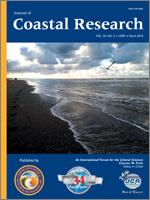Gainza, J.; Rueda, A.; Camus, P.; Tomás, A.; Méndez, F.J.; Sano, M., and Tomlinson, R., 2018. A meta-modelling approach for estimating long-term wave run-up and total water level on beaches.
Wave run-up is defined as the maximum vertical extent of wave up-rush on a beach or structure above the sea water level from wave breaking. Wave run-up is responsible for beach and dune erosion and can be an important component of coastal flooding. Run-up can be estimated using either empirical formulations or sophisticated wave-breaking models with high computational demand. On the other hand, meta-models are efficient approximations of physical-process models that enable researchers to obtain long-term time series of wave dynamics. These hybrid models are developed by combining statistical techniques and numerical models. In this study, a methodology to transform offshore sea conditions to long-term time series of wave run-up is described. The methodology combined the construction of two meta-models of offshore wave propagation to coastal areas and of nearshore wave transformation to run-up. Clustering techniques were then implemented to select a subset of spectral patterns of the offshore conditions for nearshore transfer and a subset of sea states for reconstructing the run-up. Multivariate, radial-basis functions were then fitted to the outputs of the wave propagation and wave run-up simulations to reconstruct the time series of sea-state parameters in shallow water and the time series of run-up. This methodology was applied to Palm Beach on the Gold Coast (QLD, Australia). The nearshore wave climate was validated quantitatively, whereas the reconstructed wave run-up and total water-level time series was validated with a qualitative approximation, confirming that this methodology is capable of accurately transforming the offshore wave conditions into run-up time series. The total water levels were also reconstructed to show the applicability of the results to probabilistic flood-risk analyses.





